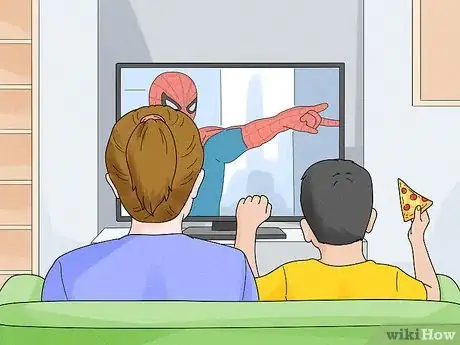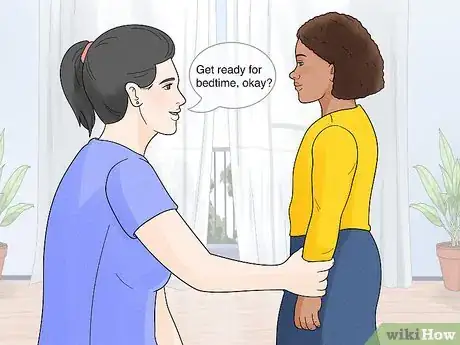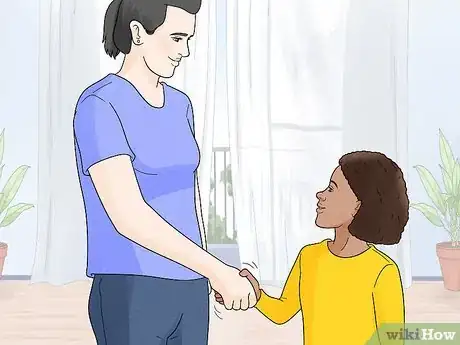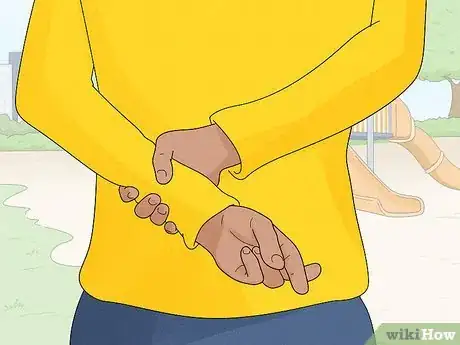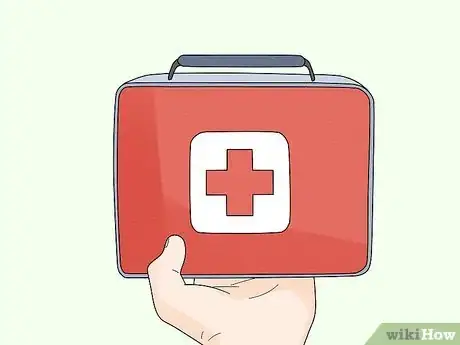This article was co-authored by Denise Stern. Denise Stern is a Parenting Specialist and the CEO of Let Mommy Sleep, the country’s leading Baby Nurse and Postpartum Care service. Denise specializes in providing nurturing care to newborns and evidence-based education to their parents. She holds a BA in Public Relations from North Carolina State University. Denise was the US Chamber of Commerce Leading Woman-Owned Business in 2013, a Washington FAMILY Magazine Mother of the Year in 2016, and on the elite White House Summit for Working Families hosted by the President and First Lady Obama in 2014. Let Mommy Sleep is the only company of its kind that holds a local government contract to teach newborn and postpartum care.
This article has been viewed 118,390 times.
Babysitting a ten-year-old is pretty different from babysitting a ten-month-old. Older kids may want to do more advanced activities and may be self-conscious about being baby-sat. However, you still need to set limits. It’s best to find a balance between making them feel independent while commanding their respect.
Steps
Having Fun
-
1Give the child a choice. Let them choose from a variety of age-appropriate activities. Older kids need different things to do than younger kids. A young kid may like to color, but an older kid may prefer movies and video games. Ask the child what they’d like to do for the evening. You usually need to prepare these activities in advance.
- If the children want to watch movies, make sure you know which ones they’re allowed to watch. Some parents are very particular about the movies their kids watch.
- If the children want to play video games, make sure to clear it with the parents first.
- Talk to the child and parents ahead of time to get some different ideas for activities and games that the child might like.
-
2Bring some crafts. Choose something age-appropriate. Children between the ages of five and ten might enjoy using watercolor paints or cutting out shapes, but older children will find this boring. Alternatively, they might enjoy making a book from scratch or learning how to use specialty art tools like oil pastels.
- Gather your tools in advance. Don’t rely on the parents to have everything you need in their house. Plus, even if the kids have a house full of toys, whatever book, game, or toy you bring along will be new and exciting and special.[1]
- Use constructive criticism when making crafts with older children. Older children can be sensitive and may not take harsh criticism well. Instead of saying "it's wonderful" or "it's horrible" say, " The line on the unicorn's tail is a little uneven, but I love the way you did the eyes".
Advertisement -
3Go to the park. Before they leave, ask the parents if there’s a park nearby that you can take the children to. Bring some kicking or catching balls, bubbles, or jump ropes. If you wear the children out, it will be easier to convince them to go to bed later. However, be sure you can handle watching them outside. Don’t let them wander off unsupervised.
- Bring a picnic dinner if you’re planning on staying at the park for a long time. It will be a fun change of routine for the children.
- Outdoor activities are better for smaller groups of children because it’s easier to keep track of them all. If you’re babysitting three or more children, stay inside.
-
4Play a fun board game. Ask the child if they have any favorite board games they’d like to play. Similarly, you could bring two or three of your own board games and let the child pick their favorite.[2] Popular board games include Twister, Monopoly, and Pictionary.
- Twister is an excellent option for high-energy children, as it will wear them out quickly.
- If any arguments break out during the board game, remain calm and positive. Try to redirect the children’s attention to playing the game.
-
5Have a movie and pizza party. Ask the parents in advance if you can order pizza for the night. While waiting for the pizza to arrive, play games to see who gets to pick the movie. For example, you could ask them to answer trivia questions. Whoever answers the most questions correctly gets to choose the movie.
- If possible, have three or four movies for the children to choose from. It will be easier to clear four movies with the parents and may prevent long arguments among the children.
- Make sure the parents leave you money for the pizza.
Setting Boundaries with the Parents
-
1Ask the parents to outline your evening with their children. What time do they normally eat dinner, and what should you serve them? What time do they go to bed? Do they need to take a bath before bed? This is important information that parents may forget to tell you.
- Bring a notepad to write down their responses. Otherwise, you may forget important details.
-
2Ask about food allergies. The parents may forget whether or not you know about their child’s food allergy, especially if they have more than one child. Make sure to ask your parents if there’s anything their child can’t eat or touch. Find out if they have any medication or an EpiPen on hand in case of an attack.[3]
- If you don’t know how to use an EpiPen, ask the parent to show you how. This is critical information that you may need.
- If necessary, ask the parents to write a detailed procedure on what to do if the child has an allergic reaction.
-
3Write down important phone numbers. Record both parents’ phone numbers in case of an emergency. If the child has a lot of health issues, they may also have a physician’s private number. If so, ask for that as well. Make sure you’re familiar with the emergency number for your area.[4]
- If you don’t have a cell phone, ask if you can use their landline in an emergency. However, if they don’t have a landline, one of the parents should leave their cell phone with you.
- Ask if the children are allowed to use the phone.
-
4Ask about rules for yourself. What movies can you show the children? What food are you allowed to eat in the fridge? Is there any food that’s being saved for later? Would they mind if you watched TV after the children went to sleep? Do they mind if you use your phone around the children? Can you take pictures of the children? Make sure you have a clear idea of their expectations for you. Otherwise, you may annoy them and they won’t call you next time they need a babysitter.[5]
- Make sure you know how to use the television before the parents leave, especially if you plan on watching TV with the children.
Controlling the Situation
-
1Set limits. If you ask the parents for guidelines in advance, you can back up these limits with parental authority. Just like younger kids, older kids need clear rules. For example, they might still have an early bedtime. You have to resist the urge to give in to their pleas and be firm about your rules.[6] [7]
- If the child has trouble cooperating, turn your instructions into a game. For example, you could challenge them to get ready for bed in under five minutes.
- Offer the child rewards for behaving. For example, let them pick the movie that you watch or the board game that you play.
- Let them know that you're aware of the family rules and say something like, "I didn't make these rules, but we do have to follow them."[8]
-
2Treat the children with respect.[9] Older children appreciate being treated like adults. For example, give them a choice whenever you can. This will show the child that you respect their opinions. Similarly, stay calm and positive when talking to the child. This will encourage them to stay calm and positive as well.
- Don’t interrupt the child when they’re talking. If you do, they’ll feel like you don’t respect what they have to say.
- Never lose your cool. If you panic, the child may lose all respect for you.
-
3Be ready for falsehoods. Some older kids like to trick babysitters. For example, they may try to convince you that they’re allowed to play outside with their friends unsupervised. Firmly tell them that you know they’re not allowed and to stop asking. Of course, it helps to have asked the parents about these limitations in advance, but when in doubt, say no.
- If they persist with their falsehood, tell them you’ll call their parents for permission.
- If you catch the child lying, don’t take it personally. Stay positive and friendly.
- If you genuinely aren't sure about something they're asking to do, be honest and tell them that because you don’t know the family’s rule, they’ll just have to wait until the parents get home.[10]
-
4Be prepared for injuries. If the worst happens, remember to keep calm. Children take cues from the authority figures in their lives; if you freak out, they’ll freak out. Refer to the list of emergency numbers that the parents gave you to figure out who to call.[11]
- If the child is in immediate danger, help them before you call the parents. The child’s safety comes first.
- If the situation requires it, you may need to move to another location. Keep the children with you at all times by holding their hands.
- Before the parents leave, ask them to show you where the first-aid kit is.
- Having a CPR and first-aid certification is always a good idea when you want to work as a babysitter.[12]
Expert Q&A
-
QuestionHow do you keep kids entertained for an hour?
 Jessie DavidsonJessie Davidson is a Child Care Specialist and the CEO and Founder of BabysitPro, which provides online courses for current and aspiring babysitters. Jessie has over 20 years of childcare experience and specializes in best practices for sitters of infants, toddlers, preschoolers, and grade-schoolers. BabysitPro’s courses are unique and age-specific so babysitters can learn detailed information relevant to the children they babysit. Jessie holds a BA in French Studies from Wheaton College and an MA in Visual Anthropology from The University of Southern California.
Jessie DavidsonJessie Davidson is a Child Care Specialist and the CEO and Founder of BabysitPro, which provides online courses for current and aspiring babysitters. Jessie has over 20 years of childcare experience and specializes in best practices for sitters of infants, toddlers, preschoolers, and grade-schoolers. BabysitPro’s courses are unique and age-specific so babysitters can learn detailed information relevant to the children they babysit. Jessie holds a BA in French Studies from Wheaton College and an MA in Visual Anthropology from The University of Southern California.
Child Care Specialist Invite your kids to help you build the ultimate fort with blankets and pillows! Don't use anything heavy to hold down the blankets, and only use pillows that won't hurt if they fall down.
Invite your kids to help you build the ultimate fort with blankets and pillows! Don't use anything heavy to hold down the blankets, and only use pillows that won't hurt if they fall down. -
QuestionHow do you entertain a bored child?
 Jessie DavidsonJessie Davidson is a Child Care Specialist and the CEO and Founder of BabysitPro, which provides online courses for current and aspiring babysitters. Jessie has over 20 years of childcare experience and specializes in best practices for sitters of infants, toddlers, preschoolers, and grade-schoolers. BabysitPro’s courses are unique and age-specific so babysitters can learn detailed information relevant to the children they babysit. Jessie holds a BA in French Studies from Wheaton College and an MA in Visual Anthropology from The University of Southern California.
Jessie DavidsonJessie Davidson is a Child Care Specialist and the CEO and Founder of BabysitPro, which provides online courses for current and aspiring babysitters. Jessie has over 20 years of childcare experience and specializes in best practices for sitters of infants, toddlers, preschoolers, and grade-schoolers. BabysitPro’s courses are unique and age-specific so babysitters can learn detailed information relevant to the children they babysit. Jessie holds a BA in French Studies from Wheaton College and an MA in Visual Anthropology from The University of Southern California.
Child Care Specialist Make an obstacle course for them! Try getting creative with whatever supplies you have access to.
Make an obstacle course for them! Try getting creative with whatever supplies you have access to. -
QuestionHow can I be a cool babysitter?
 Jessie DavidsonJessie Davidson is a Child Care Specialist and the CEO and Founder of BabysitPro, which provides online courses for current and aspiring babysitters. Jessie has over 20 years of childcare experience and specializes in best practices for sitters of infants, toddlers, preschoolers, and grade-schoolers. BabysitPro’s courses are unique and age-specific so babysitters can learn detailed information relevant to the children they babysit. Jessie holds a BA in French Studies from Wheaton College and an MA in Visual Anthropology from The University of Southern California.
Jessie DavidsonJessie Davidson is a Child Care Specialist and the CEO and Founder of BabysitPro, which provides online courses for current and aspiring babysitters. Jessie has over 20 years of childcare experience and specializes in best practices for sitters of infants, toddlers, preschoolers, and grade-schoolers. BabysitPro’s courses are unique and age-specific so babysitters can learn detailed information relevant to the children they babysit. Jessie holds a BA in French Studies from Wheaton College and an MA in Visual Anthropology from The University of Southern California.
Child Care Specialist Be really proactive about play time by bringing age-appropriate activities with you or by having ideas for activities that don't require special materials. For instance, you could make your own card game by assigning an activity to each card suit. Whatever card is drawn, everyone will do the amount of the activity listed (e.g., do 6 jumping jacks when someone draws a 6 of hearts).
Be really proactive about play time by bringing age-appropriate activities with you or by having ideas for activities that don't require special materials. For instance, you could make your own card game by assigning an activity to each card suit. Whatever card is drawn, everyone will do the amount of the activity listed (e.g., do 6 jumping jacks when someone draws a 6 of hearts).
Warnings
- Never leave children alone in the bathtub, especially young children. It could lead to drowning or kids fooling around and choking on water.⧼thumbs_response⧽
- Try to model the children's behavior by setting a good example and being a role model at all times.[16]⧼thumbs_response⧽
References
- ↑ Jessie Davidson. Child Care Specialist. Expert Interview. 7 July 2021.
- ↑ Jessie Davidson. Child Care Specialist. Expert Interview. 7 July 2021.
- ↑ http://www.parenting.com/article/10-tips-from-a-teenage-babysitter
- ↑ http://www.med.umich.edu/yourchild/topics/babysit.htm
- ↑ http://www.parenting.com/article/10-tips-from-a-teenage-babysitter
- ↑ http://www.parenting.com/article/10-tips-from-a-teenage-babysitter
- ↑ Denise Stern. Parenting Specialist. Expert Interview. 19 February 2021.
- ↑ Jessie Davidson. Child Care Specialist. Expert Interview. 7 July 2021.
- ↑ Denise Stern. Parenting Specialist. Expert Interview. 19 February 2021.
- ↑ Jessie Davidson. Child Care Specialist. Expert Interview. 7 July 2021.
- ↑ http://www.med.umich.edu/yourchild/topics/babysit.htm
- ↑ Denise Stern. Parenting Specialist. Expert Interview. 19 February 2021.
- ↑ Denise Stern. Parenting Specialist. Expert Interview. 19 February 2021.
- ↑ Denise Stern. Parenting Specialist. Expert Interview. 19 February 2021.
- ↑ Denise Stern. Parenting Specialist. Expert Interview. 19 February 2021.
- ↑ Denise Stern. Parenting Specialist. Expert Interview. 19 February 2021.
About This Article
To babysit an older child, you’ll want to find a balance between having fun and setting boundaries. Older kids like to have choices, so talk to them and their parents ahead of time about movies or video games they're allowed to watch or play. For more creative kids, bring some age-appropriate crafts with you, like oil pastels or a make-your-own comic book. You can also bring or suggest some fun board games, like Pictionary or Monopoly. In order to maintain the normal home routine, ask the parents about dinner time, bedtime, and foods that are off-limits. However, if you want to show the child that a night with a sitter can be fun, ask the parents about ordering a pizza or taking a picnic to the park. To learn how to treat the child you’re babysitting with respect, keep reading!





